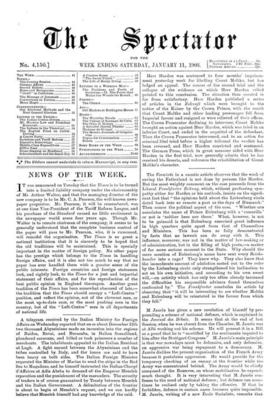A telegram received by the Italian Ministry for Foreign Affairs
on Wednesday reported that on or about December 12th two thousand Abyssinians made an incursion into the regions of Baidoa, Revai, and Buracaba, in Italian Somaliland, plundered caravans, and killed or took prisoners a number of merchants. The inhabitants appealed to the Italian Resident at Lugh. A fight ensued between the Abyssinians and the tribes controlled by Italy, and ther hisses are said to have been heavy on both sides. The Italian Foreign Minister requested the Minister of Marine to send the ships in the Red Sea to Magadoxo, and be himself instructed the Italian Charge d'Affaires at Adis Abeba to demand of- the Emperor Menelek reparation and the punishment of the marauders. The security of traders is of course guaranteed by Treaty between Menelek and the Italian Government. A delimitation of the frontier is about to begin at Menelek's request, and we can hardly believe that Menelek himself had any knowledge of the raid. Herr Harden was sentenced to four months' imprison- ment yesterday week for libelling Count Moltke, but has lodged an appeal. The course of the second trial and the collapse of the evidence on which Herr Harden relied pointed to this conclusion. The situation thus created is far from satisfactory. Herr Harden published a series of articles in the Zukunft which were brought to the notice of the Kaiser by the Crown Prince, with the result that Count Moltke and other leading personages fell from Imperial favour and resigned or were relieved of their offices. The Crown Prosecutor declining to intervene, Count Moltke brought an action against Herr Harden, which was tried in an inferior Court, and ended in the acquittal of the 'defendant. Then the Crown Prosecutor intervened, and in an action for criminal libel tried before a higher tribunal the verdict has been reversed, and Herr Harden convicted and sentenced. The German Press, which in great measure sided with Herr Harden in the first trial, now generally admits that he has received his deserts, and welcomes the rehabilitation of Count Moltke's character.










































